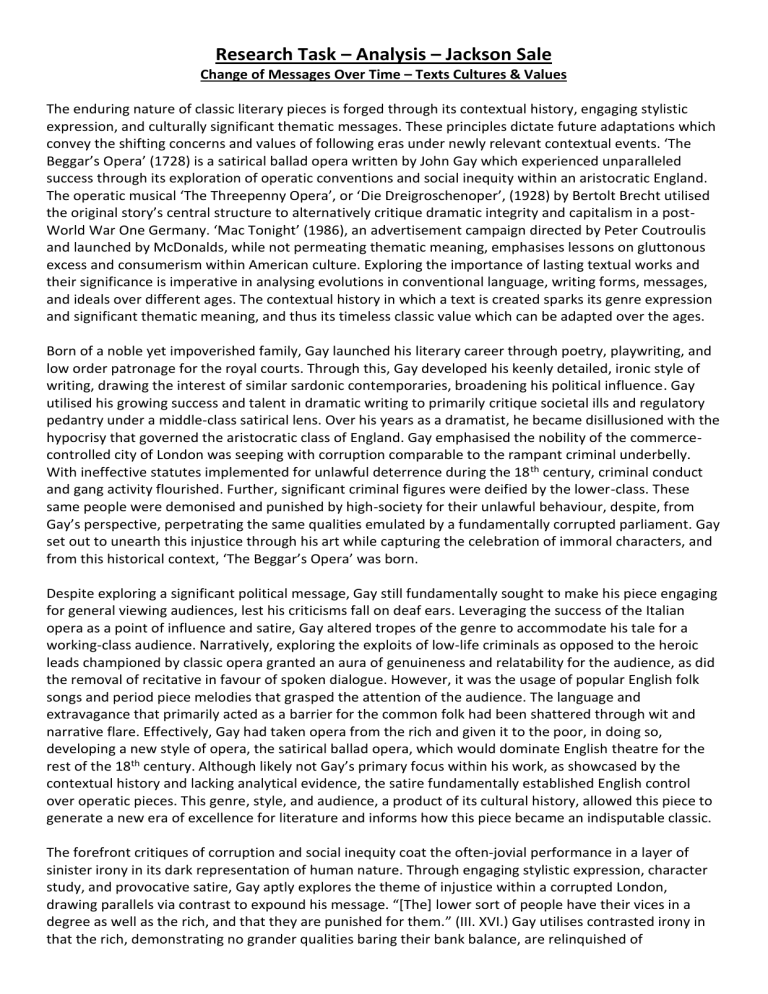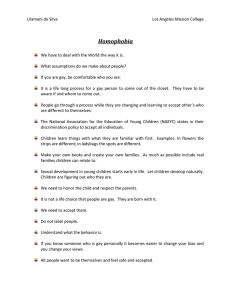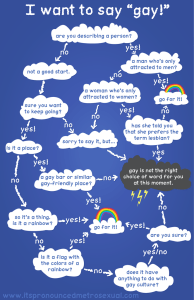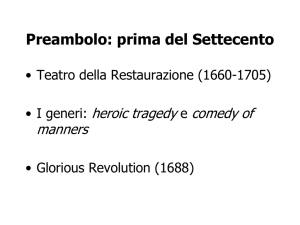
Research Task – Analysis – Jackson Sale Change of Messages Over Time – Texts Cultures & Values The enduring nature of classic literary pieces is forged through its contextual history, engaging stylistic expression, and culturally significant thematic messages. These principles dictate future adaptations which convey the shifting concerns and values of following eras under newly relevant contextual events. ‘The Beggar’s Opera’ (1728) is a satirical ballad opera written by John Gay which experienced unparalleled success through its exploration of operatic conventions and social inequity within an aristocratic England. The operatic musical ‘The Threepenny Opera’, or ‘Die Dreigroschenoper’, (1928) by Bertolt Brecht utilised the original story’s central structure to alternatively critique dramatic integrity and capitalism in a postWorld War One Germany. ‘Mac Tonight’ (1986), an advertisement campaign directed by Peter Coutroulis and launched by McDonalds, while not permeating thematic meaning, emphasises lessons on gluttonous excess and consumerism within American culture. Exploring the importance of lasting textual works and their significance is imperative in analysing evolutions in conventional language, writing forms, messages, and ideals over different ages. The contextual history in which a text is created sparks its genre expression and significant thematic meaning, and thus its timeless classic value which can be adapted over the ages. Born of a noble yet impoverished family, Gay launched his literary career through poetry, playwriting, and low order patronage for the royal courts. Through this, Gay developed his keenly detailed, ironic style of writing, drawing the interest of similar sardonic contemporaries, broadening his political influence. Gay utilised his growing success and talent in dramatic writing to primarily critique societal ills and regulatory pedantry under a middle-class satirical lens. Over his years as a dramatist, he became disillusioned with the hypocrisy that governed the aristocratic class of England. Gay emphasised the nobility of the commercecontrolled city of London was seeping with corruption comparable to the rampant criminal underbelly. With ineffective statutes implemented for unlawful deterrence during the 18 th century, criminal conduct and gang activity flourished. Further, significant criminal figures were deified by the lower-class. These same people were demonised and punished by high-society for their unlawful behaviour, despite, from Gay’s perspective, perpetrating the same qualities emulated by a fundamentally corrupted parliament. Gay set out to unearth this injustice through his art while capturing the celebration of immoral characters, and from this historical context, ‘The Beggar’s Opera’ was born. Despite exploring a significant political message, Gay still fundamentally sought to make his piece engaging for general viewing audiences, lest his criticisms fall on deaf ears. Leveraging the success of the Italian opera as a point of influence and satire, Gay altered tropes of the genre to accommodate his tale for a working-class audience. Narratively, exploring the exploits of low-life criminals as opposed to the heroic leads championed by classic opera granted an aura of genuineness and relatability for the audience, as did the removal of recitative in favour of spoken dialogue. However, it was the usage of popular English folk songs and period piece melodies that grasped the attention of the audience. The language and extravagance that primarily acted as a barrier for the common folk had been shattered through wit and narrative flare. Effectively, Gay had taken opera from the rich and given it to the poor, in doing so, developing a new style of opera, the satirical ballad opera, which would dominate English theatre for the rest of the 18th century. Although likely not Gay’s primary focus within his work, as showcased by the contextual history and lacking analytical evidence, the satire fundamentally established English control over operatic pieces. This genre, style, and audience, a product of its cultural history, allowed this piece to generate a new era of excellence for literature and informs how this piece became an indisputable classic. The forefront critiques of corruption and social inequity coat the often-jovial performance in a layer of sinister irony in its dark representation of human nature. Through engaging stylistic expression, character study, and provocative satire, Gay aptly explores the theme of injustice within a corrupted London, drawing parallels via contrast to expound his message. “[The] lower sort of people have their vices in a degree as well as the rich, and that they are punished for them.” (III. XVI.) Gay utilises contrasted irony in that the rich, demonstrating no grander qualities baring their bank balance, are relinquished of chastisement while the poor are damned to perish for their actions. Following this, the Beggar, emblematic of Gay himself, grants a happy ending to all involved through deus ex machina. Despite granting this boon for Macheath; a symbolic champion for the lower-class everyman; the audience can still derive the injustice that plagues the real world would have culminated with his death at the gallows. This grants further ironic meaning between the fictional satirical world constructed by Gay and the reality of London inequity between classes. Through his social critique, Gay further extends his criticism towards parliamentary congress, indicating their lack of change regarding laws governs this corruption among class division. Gay conveys through his ironic satire that corruption breeds inequity, separating the rich and the poor through social status and dividing a nation dictated by “fashionable vices”. With these imperative principles culminating in the creation of a classic piece of literature, adaptations conveying new perspectives, messages and alterations were bound to develop over time. As of 1923, having suffered the greatest military defeat in known history, the state of German affairs had recently rebounded from the precipice of societal collapse. The Weimer Republic was loosely quelling complete civilian unrest and political power seizes, whilst managing hyperinflation, unemployment, and wartime reparations which had been crippling the economy. With German currency decreasing in value with such volatility, spending habits on leisure increased as money earned could be worthless the following day. As radical economic reforms temporarily stabilised the currency, the nation entered a period of cultural renaissance known as the ‘Golden Twenties (1924-29)’. Brecht, a renowned playwright and vocal socialist advocate, blamed capitalistic systems for indulging in excess and destabilising the economy, which he felt civilians failed to acknowledge. During this period, Brecht became swayed by Marxist ideology and cemented his anti-capitalist perspective, pitting his social critique against the bourgeoisie which he dictated corrupt for their involvement in a greedy system. Vying to unearth the immoral dangers, Brecht utilised the anti-establishment framework provided by ‘The Beggar’s Opera’ to alternatively launch his capitalism fuelled greed critique. This laid the foundational work for ‘The Threepenny Opera’. To convey his criticism, Brecht allocated to intentionally alienate and educate his primarily bourgeoisie audience directly as opposed to Gay’s universally-accepting, entertainment centric structure. Through this, Brecht incidentally emulated Gay’s operatic satirisation, popularising a new subgenre of drama, epic theatre. Brecht utilised this subgenre with the intention of eliminating audience complacency. He instead chose to force the audience to acknowledge the central ideas and messages presented, showcasing disconnected melodies, stereotypical characters, and narratological metalepsis. This further served to defy Wagnerian-operatic conventions that dominated musical theatre. In achieving this, Brecht successfully created a thought-provoking, convention defying, American jazz inspired operatic musical fusion, as engaging as it is difficult to define. Given this perplexing mantra, a common interpretation of Brecht’s work, similar to Gay’s, is the notion that the piece strove to dismantle the operatic medium, rebuilding it in a manner that reflected the desires of the middle-class masses. Given the limited supporting textual evidence and Brecht’s anti-bourgeois leaning however, this would have primarily derived from Gay’s adapted framework and the epic theatre subgenre. From this stylistic change, the message is further developed within Brecht’s adapted narrative. In a static corrupted government controlled by greed, it is complacency which drives the morally bankrupt to exploit a broken system. Influenced by Gay’s writings, Brecht utilises sardonic metacommentary and symbolic comparison to highlight the corrupting nature of capitalism and the greed it inspires within individuals and high-order society. "We all are running after luck; And luck is running last. [… Man’s] ideal ambitions; Are one great big cheat" (III. I.) The lyrics outline the futility of pursing happiness and ambition, instead dictating an assured resignation to a life without true fulfilment. Sung in a celebratory tone, from a ballad titled ‘The Song of the Futility of All Human Endeavor’, the text uses satire to showcase how a capitalistic lifestyle has irreparably warped the character, Peachum’s, morals, stripping the human experience of immaterial meaning. Peachum acts as a representation of the people forced to conform to capitalist ideals for survival, accentuating the cruel nature of reality. It further conveys the competitive nature of capitalist society, comparing luck to a race and ambition as a cheat to be discouraged. This reflects Brecht’s perspective that in a selfish world fuelled by greed we have reached an inability to recognise the plights of others and to improve society unless radical changes are implemented. This adaptation of ‘The Beggar’s Opera’ changed its message in a substantial manner while maintaining most of the core attributes of the original that propelled its success. As media expression developed, advertisements and promotional material became inescapable elements of western culture. In a cutthroat market, brands fought desperately for exposure and minute to minute market share. The tremendously high-stakes initiated the ‘Burger Wars’, which placed fast-food megacorporation McDonald’s at the epicentre of an onslaught at all sides. Having been thrust into an advertisement arms race, the conglomerate was desperate to regain firm footing, and began mass-funding promotional campaigns. Creative director for a small advertisement firm, Coutroulis was commissioned with creating an advertisement that would increase patronage during evening hours. Coutroulis drew inspiration from larger-than-life fantastical mascots and hit songs of the past. With the success of ‘The Threepenny Opera’, revised jazz covers of the opera’s opening song ‘The Ballad of Mack the Knife’ gained immense popularity. Using this, Coutroulis changed the name of the titular character to Mac Tonight, from which this campaign began to bear fruit. To create something distinctively different, Coutroulis chose to explore the advertisement under a surrealist lens, eager to separate his concept from contemporaries. Creating an elaborate set of hand-built miniatures, Coutroulis was able to orchestrate an organic display of cartoonish fantasy, with giant food items eclipsing the intricately designed city scapes. Comparatively, the practical costume work of the newly designed Mac Tonight, shaped as a crescent moon, singing the classic catchy ballad offered the audience a dose of nostalgia. The result was a portrayal of a new transcendent age of McDonalds led advancement, providing the world with all of its delicious earthly desires in abundance. However, given the advertisements origins as an adaptation, it is these same gluttonous vices of excess that were foremost critiqued as fundamentally causing the corruption inherent within each system. “How 'bout a McD-L-T; Or Chicken McNuggets; With those famous fries.” These lyrics, fervently served with irony, demonstrate the continual cycle of societies to employ ‘fashionable vices’ that fundamentally corrupt governments and breed selfish impulse. Positioning itself as a utopia, the advertisement demonstrates that these vices are prominently present within western American culture, arguably the nation that consumes in greatest excess. This interpretation, although not intended, informs the adaptations change in message. Divulging meaning from art in which there is none intended may seem to be a pointless exercise, however drawing societal and literary parallels enlightens true understanding. In Mac Tonight’s bid for nostalgic individualism, the messages of the original tale and its faithful adaptation have been skewed under layers of incidental sardonic irony. Macheath has developed from a flawed champion for the lower-class acting as a comparable and fighting force against the abuse of power and social inequity. Mack the Knife alternatively presents a misinterpreted narcissistic personification of systemic capitalist corruption and greed which poisons the bourgeoisie. From this, Mac Tonight demoralises the figure into a mascot for the most capitalistic corporation on the planet, expanded through gluttonous indulgences which encourages the exact vices Gay and Brecht sought to unroot. Through irony, this development provides a broader critique of consumeristic culture, in which stories, characters, and messages are transformed into cash cows which can be harvested regardless of their initial intent. Emblematic of its fast-food influence, messages have become mass-producible and easily consumable, which may grant the greatest change in message overall. Through all this, the principles remain the same, contextual history and stylistic expression influence the thematic message’s meaning, which changes with history over time. Endnotes StudyCorgi., 2021. "The Beggar's Opera" by John Gay | Free Essay Example. [online] StudyCorgi.com. Available at: <https://studycorgi.com/the-beggars-opera-by-john-gay/> [Accessed 29 August 2022]. Bö ker, U., 2006. John Gay's The beggar's opera 1728 - 2004. Amsterdam [u.a.]: Rodopi. Dabydeen, D., 1983. Commerce and slavery in eighteenth century literature. [online] Ro.uow.edu.au. Available at: <https://ro.uow.edu.au/cgi/viewcontent.cgi?article=1172&context=kunapipi> [Accessed 29 August 2022]. Zucker, E., 2013. The Beggar’s Opera Study Guide. [online] Gradesaver.com. Available at: <https://www.gradesaver.com/the-beggars-opera> [Accessed 29 August 2022]. Radney, I., 2018. B-Sides: John Gay’s “The Beggar’s Opera” - Public Books. [online] Public Books. Available at: <https://www.publicbooks.org/b-sides-john-gays-the-beggars-opera/> [Accessed 29 August 2022]. Thomas, D., 2016. Discuss some of the targets of the satire in John Gay&#39;s The Beggar’s Opera. [online] Academia.edu. Available at: <https://www.academia.edu/25773392/Discuss_some_of_the_targets_of_the_satire_in_John_Gays_The_ Beggar_s_Opera> [Accessed 29 August 2022]. Dickson, A., 2018. ‘To lash the age’: John Gay and The Beggar’s Opera. [online] Bl.uk. Available at: <https://www.bl.uk/restoration-18th-century-literature/articles/to-lash-the-age-john-gay-and-thebeggars-opera> [Accessed 29 August 2022]. N/A, 2022. The Beggar's Opera: The Music. [online] Websites.umich.edu. Available at: <http://websites.umich.edu/~ece/student_projects/beggars_opera/music.html#:~:text=Evidence%20of%2 0its%20popularity%20in,the%2018th%20century%20after%201728.&text=The%20Beggar's%20Opera%20 was%20a,Robert%20Walpole%20and%20his%20government.> [Accessed 29 August 2022]. Anfinson, C., 1966. The Songs of The Beggar 's Opera. Eastern Illinois University Verna Tandan, B., 1971. THE BEGGAR'S OPERA OF JOHN GAY. McMaster University McIntosh, W., 1974. Handel, Walpole, and Gay: The Aims of The Beggar's Opera. Johns Hopkins University Gallacher, I., 2006. The Beggar's Opera and its Criminal Law Context. Syracuse University College of Law Bear, R., 1992. The Beggar's Opera John Gay. University of Oregon Greenblatt, S., 2012. The Norton Anthology of English Literature. Smith, J., 2022. The Threepenny Opera Study Guide. [online] Gradesaver.com. Available at: <https://www.gradesaver.com/the-threepenny-opera> [Accessed 29 August 2022]. N/A, 2022. THE THREEPENNY OPERA. MadisonOpera Gordon, R., 2017. Brecht, interruptions and epic theatre. [online] Bl.uk. Available at: <https://www.bl.uk/20th-century-literature/articles/brecht-interruptions-and-epic-theatre> [Accessed 29 August 2022].


![-----Original Message----- [mailto:] Sent: Tuesday, March 15, 2005 4:00 PM](http://s2.studylib.net/store/data/015587023_1-54e94fc602323868fe7d0334a40d4ded-300x300.png)

![-----Original Message----- From: Bill Cooper [ ]](http://s2.studylib.net/store/data/015588360_1-d4b352c98594c85a1d0deed4a50231da-300x300.png)